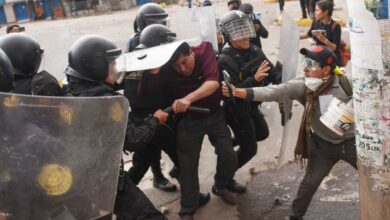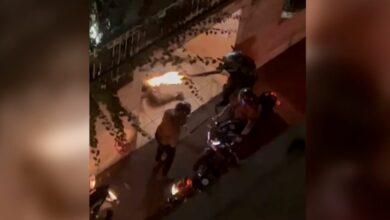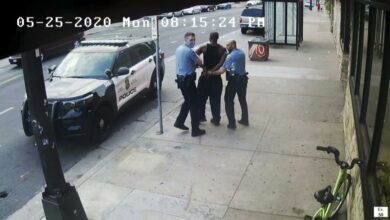In one of his acts, Egyptian stand-up comedian George Azmy satirically mocks Egyptian culture and lifestyle. With time, he says, Egyptians’ foreheads will gradually feature glued on see-through slots, where they can conveniently slip in their national ID cards. Through this sarcastic bout of humor, Azmy suggests what citizens from all socio-economic backgrounds already seem to know: Security excesses across the nation are a big problem. And countless have suffered first-hand.
Karim–whose name was changed to protect his identity–is one among countless victims of abusive police intervention in Egypt. The young man says he was recently harassed and humiliated by a Cairo police officer after a night of work. He was detained, interrogated, threatened and humiliated for over an hour by two plainclothes officers. After requesting his official documents and despite finding everything in order, the officers continued to hold him, threatening to take him to the station and detaining him there for days. Unpleased with his style of clothes and lifestyle, they relentlessly mocked and insulted him, he says, ignoring his questions about why he was being held and disregarding his pleas to be allowed to go home.
Several days later, the university graduate says the incident is hard to forget.
“The psychological impact, the way they spoke to me, the humiliation, the way they picked on me–it’s worse than anything physical. I would be ok with being taken to the station or whatever, if I had actually done something wrong, if I had committed a crime. But you can’t mistreat me or abuse your power to let out your frustrations.”
While a humiliating check on Karim by what he describes as angry, “mentally unstable” officers had a far-reaching impact on him psychologically, causing him to withdraw and remain at home for several days, he is, in some ways, lucky to be alive. As he recounts his ordeal, a skeptical nation is still doubting the results of the second autopsy of 28-year-old Khaled Saeed, whose alleged murder at the hands of Alexandrian police on 6 June has made international headlines.
While international organizations have been placing more attention on the torture of political prisoners and activists of late, regular Egyptian citizens are in much larger numbers abused daily. Police in this country are omnipresent. Egyptians casually drive through a myriad of traffic police security checkpoints across their respective cities daily. Incidents of civilian torture, rape and murder are no secrets. Human rights groups have repeatedly called police brutality in Egypt “routine and systematic.”
A 2009 report by the Egyptian Organization for Human Rights documented 46 torture cases and 17 cases of death between June 2008 to February 2009. Human rights activists charge that this number has been on the increase in the last decade due to a lack of accountability, which encourages police officers to continue such practices.
While police assault and torture are illegal practices, political dynamics make it such that there is a wide gap between the legal realm and the reality on the ground, says lawyer and chair of democracy NGO United Group Negad el-Borai. The culprit is the emergency law, in place since 1967, which gives Egyptian security forces a carte blanche to use whatever tactics they may deem necessary to implement the law.
“The emergency law controls the country. The police are instructed to take the needed steps to implement it,” el-Borai explains. “That gives them a wide range of things they can do. For more than three decades, we have had generations of police officers enjoying extreme levels of authority. Nobody can stop them.”
While police repression and abuse remains a global phenomenon, critics of the Egyptian government charge that in dictatorships it is used to spread a culture of repression and fear. They say that privileged status and power enjoyed by the nation’s Interior Ministry and security forces go hand-in-hand with the Emergency Law, exacerbating the larger problem of an extreme security apparatus on the ground.
Bahey Eddin Hassan, general director of the Cairo Institute for Human Rights Studies, emphasizes that police brutality is indeed entirely linked to political dynamics. According to Hassan, legislative powers in Egypt are dominated by the executive. Furthermore, within the executive power itself, the security apparatus receives “better treatment” and enjoys more power than their counterparts.
Thus, while citizens may elect representatives to the legislature, in practice members have little power, rendering citizens’ votes no more than a gesture with little real outcome. “The absence of balance within the government itself makes it impossible to have a truly democratic regime and thus, respect of human rights,” says Hassan.
“The main challenge is the growing influence and power of security forces over every single other institution and other powers,” he adds. “This has a very negative impact even on the shaping of new laws, amendments to the constitution, new policies, and the appointment of ministers and senior officials in all areas of the government. So the real issue is balance of power.”
This lack of balance between overseeing powers in the country works for the “hegemony of the security apparatus”, says Hassan, enabling police officers to exercise violent behavior without minimum accountability.
“The problem here is not a question of whether certain behavior is legal or illegal, because under the state of emergency, the power of security forces has become absolute. It has become a hegemonic force in the country, even judicially,” he says. “So, during arrest periods, for example, anyone can be subject to all kinds of forms of ill treatment, torture, detained for unlimited periods of time if the officer feels the need to, despite the fact that these practices are all, in theory, illegal.”
A disproportionately small number of affected citizens file complaints as victims are highly skeptical that they will achieve justice. They understand, albeit subconsciously, that lack of balance within the government prevents respect of their civil rights.
“Without a real balance of power, you do not have the rule of law and judicial independence,” adds Hassan. “Without real balance, you lose the voice of the people.”
While citizens belonging to different socio-economic groups can expect to receive different treatment from police, they share one important similarity: They all fear the police.
“If you are Egyptian, then you know not a single person trusts the police, no matter what their social status is,” says Hassan. “Even if you are rich and you enjoy a strong social status, you don’t trust the police, because you know how things work, how forces are mobilized and how the institution is not objective. Egyptians don’t trust the police–they fear the police. This is totally different from trust or respect.”
This is certainly the case for Karim. But while the Emergency Law and broader political dynamics may be guiding things from the top, what Karim says he experienced was simply an ethical transgression.
Amidst a painful and humiliating interrogation, the cops, he recounts, abandoned him temporarily in order to perform their dawn prayers.
“I was treated like I was sub-human, for no reason at all, by a couple of cops who claim to stand up for principles in which they don’t even believe. When you’re a dirty cop and you accept bribes, you shouldn’t talk about principles, and then go pray to prove a point–this is fake. That’s the problem. It’s about sound principles, good behavior, and honesty.”




